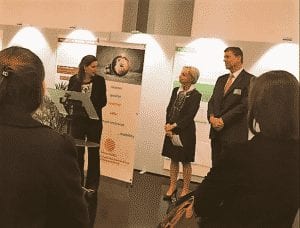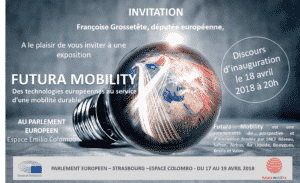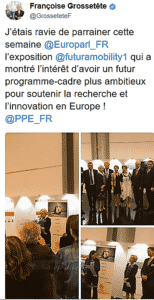Futura-Mobility in Strasbourg – 17-19 April
Futura-Mobility in Strasbourg – 17-19 April
To share its vision on the future of mobility and encourage co-innovation, Futura-Mobility held an exhibition over three days at the European Parliament in Strasbourg.

Below the opening speech by Joëlle Touré (photo above), delegate general of Futura-Mobility:
Honorable Member Françoise Grossetête,
Ladies and gentlemen honorable European Members,
Thank you Honorable Member Françoise Grossetête for joining with us for this initiative. Many thanks also for hosting us at the European Parliament for this exhibition.
Futura-Mobility is a think tank created by major industrial groups to reflect together on the future of mobility come 2050. We are seven in total: SNCF Réseau, Airbus, Air Liquide, Bouygues, Keolis, Safran, and Valeo.
Together at Futura-Mobility we are looking ahead to mobility come 2050. The vision is purposely ‘far-future’ since in terms of industrial development, what will be in place come 2050 is already being planned today.
Together, and with other members of our community (researchers, other industrials, start-ups…), we are exploring the major trends disrupting mobility. Let me now outline those we judge the most significant.
First, the urgent need to make the ecological shift in mobility happen. This was a guiding theme for Futura-Mobility throughout 2017. I would now like to present some of the opinions that arose during our work sessions:
– we believe the energy mix will comprise multiple options – electricity, including hydrogen; nuclear; and so-called ‘renewables’ such as biofuels and possibly natural gas;
– there is, however, a serious risk of shifting from dependency on oil to dependency on rare-metals: much progress is still required at the technology level for ‘renewables’;
– we are convinced rolling out responsible innovations to the widest-possible-audience calls for a subtle combination of regulation (the ‘stick’ approach) and incentives (the ‘carrot’). Here your role is obviously crucial! No matter how promising the innovations, they cannot be deployed in the time available to us without the backing of strong regulation.
Next, we are of course exploring the shift in mobility behaviour. On this point, our main concerns are:
– on sharing: what is the real trend here? Is it about sharing (as everyone seems to think and which is reassuring from an ecological point of view), or rather the search for freedom? Freedom to choose one’s mobility at any time? Freedom to overcome constraints? Take private car use, for instance. Here the sharing trend might be at threat from autonomous vehicles, which are indeed set to overcome constraints linked to ownership – such as parking and repairs;
– Another concern is how authorities will manage all the mobility modes, including private initiatives not yet subject to regulation. Indeed, the lines are blurring-between individual and collective transport, between private and public transport. And on this point, authorities are broadening their views. Consequently, we are also seeing change in the relations between operators (all types), the public (who are entering the debate), and regulators.
The third major trend in our sights is the digital revolution, which of course, as you well know, is progressing fast. For mobility, this development represents:
– a huge opportunity for the public by enabling user-friendly intermodality including all transport modes, and even ticketing; This is already a reality in certain European cities;
– at the same time, disintermediation of mobility operators is a possible threat. In other words, the transfer of value to platforms, some of which are already in dominant positions but not yet fully subject to regulation for the common good;
– hand-in-hand with the digital revolution comes the major risk of cyberattacks. This threat became widescale reality in 2017 with the hacking of Renault, Fedex, SNCF and Deutsche Bahn, amongst others. Given the stakes at play, this issue is a serious concern.
To conclude, our world is experiencing the start of dramatic change in global stability.
Competition from China’s industrial powerhouse; families moving up into the middle class, particularly in Asia; the population boom in Africa; the rising number of megacities worldwide…. All these changes explain why demand for mobility – through choice and obligation; every day and occasional; local and international – is exploding.
It is very much up to us, as European industry groups active worldwide, to provide answers that respect the health of citizens; that are safe and inclusive.
Europe’s mobility industry is innovating. It needs support from the European Union to engage in and speed up research and innovation programmes. Already competitive today, through innovation, the European industry can remain so tomorrow while continuing to embody the social values of Europe.
This is the vision we are presenting here to you, ladies and gentlemen honorable European Members, through this exhibition. It is an opportunity to show you the innovative results of research carried out within the framework of European research and innovation programmes. It is also an occasion to share ways forward as we work together to build tomorrow’s mobility.
Thank you for your attention and have a good evening.





